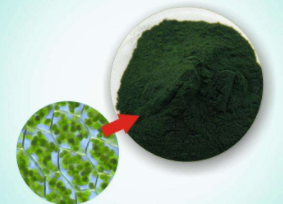Chlorophyll can reduce cancer risk and prolong life
- Normal Liver Cells Found to Promote Cancer Metastasis to the Liver
- Nearly 80% Complete Remission: Breakthrough in ADC Anti-Tumor Treatment
- Vaccination Against Common Diseases May Prevent Dementia!
- New Alzheimer’s Disease (AD) Diagnosis and Staging Criteria
- Breakthrough in Alzheimer’s Disease: New Nasal Spray Halts Cognitive Decline by Targeting Toxic Protein
- Can the Tap Water at the Paris Olympics be Drunk Directly?
Chlorophyll can reduce cancer risk and prolong life
Chlorophyll can reduce cancer risk and prolong life. British “Daily Express”: Chlorophyll can reduce cancer risk and prolong life.
Photosynthesis is the process of converting light energy into chemical energy. As a pigment that exists in all green plants and other organisms, chlorophyll is essential for photosynthesis. According to health experts, chlorophyll should be a part of daily life and bring many health benefits.

[Article from the British “Daily Express” January 10, 2021] Title: Chlorophyll can reduce the risk of cancer and promote liver health, thereby extending life.
Photosynthesis is the process of converting light energy into chemical energy. As a pigment that exists in all green plants and other organisms, chlorophyll is essential for photosynthesis. According to health experts, chlorophyll should be a part of daily life and bring many health benefits.
The vitamins, antioxidants and healing properties contained in chlorophyll are all beneficial to the human body.
Dr. Keith Kantor, a nutritionist, dietitian, and CEO of the Nutritional Addiction Relief Eating Program, said: “Chlorophyll can suppress appetite, help lose weight, reduce insulin peaks and appetite, help skin healing and blood detoxification, reduce cancer risk, and increase Energy, (as a natural deodorant) eliminates odors and strengthens the immune system.”
People have used chlorophyll as a health supplement for many years. Various medical studies have shown that it may be helpful for (improving) skin conditions, (eliminating) body odor and fighting certain types of cancer.
The Journal of Nutrition Research pointed out that although the application of chlorophyll derivatives in traditional medicine has been well documented, their potential as cancer preventive agents has received a lot of attention. Due to the cancer preventive effects of chlorophyll derivatives, biological activities include anti-oxidation, anti-mutation activity, mutagens trapping, regulation of heterologous biological metabolism and induction of apoptosis. Natural chlorophyll derivatives can also modulate cancer biomarkers.
Recent research work also includes the study of the effects of digestive factors on the structure and bioavailability of chlorophyll (the difficulty for substances to enter the body and be bioavailable), in order to better understand the biological activity of these pigments in the human body, thereby preventing Cancer has a more systemic impact.
The National Library of Medicine and the National Institutes of Health published a study on chlorophyll prolonging life. The results showed that chlorophyll is bioavailable because it can be absorbed by worms, which is an important prerequisite for antioxidant and longevity activities in the body. Therefore, our research supports the view that green vegetables may also benefit humans. In short, experiments have proved that chlorophyll has significant antioxidant activity and significantly improves the antioxidant capacity of C. elegans. Therefore, dietary chlorophyll derivatives support the advice of nutritionists to eat green vegetables and salads with high chlorophyll content, thereby improving human health and preventing diseases.
Another study published in “Science Alert” analyzed the effects of chlorophyll on body function and blood sugar levels. The study pointed out that blood sugar levels may be affected by various chlorophylls. Experiments have proved that chlorophyll has antioxidant activity, which exists in various foods. Compared with the control group, a diet rich in chlorophyll will cause a slight decrease in the number of white blood cells, hematocrit, and hemoglobin, while the number of red blood cells will increase. The conclusion is that chlorophyll is likely to have an important effect on blood sugar and is good for weight control, which needs further research to confirm.
In addition to neuroprotection and appetite suppression, chlorophyll can also promote liver health and balance the intestinal flora. A study published in Frontiers in Physiology in 2018 found that chlorophyll may help relieve symptoms of liver fibrosis by reducing harmful gut bacteria. The study also showed that chlorophyll may reduce liver inflammation in mice with liver fibrosis and protect the small intestine. Its beneficial effect on the intestinal flora provides a broad prospect for future research.
(sourceinternet, reference only)
Disclaimer of medicaltrend.org



